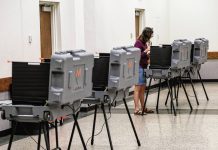Two candidates vying for the Indiana State House District 59 seat support exempting student debt relief from state taxes after Indiana said it planned to consider the forgiven debt as taxable income.
However, the two candidates — incumbent Rep. Ryan Lauer, R-Columbus, and Democratic challenger Ross Thomas — have different views on whether those with student loan debt should have gotten any relief at all.
Lauer characterized the Biden administration’s student debt relief plan as unconstitutional and a “thumb in the eyes of working-class families.” But he said, “Indiana should not be taxing debt forgiveness on student loans up to a certain amount.”
Lauer clarified that the “certain amount” is up to $10,000 in forgiven student loan debt, though he said he was still clarifying whether Pell Grant recipients with forgiven student loans are already exempt from paying taxes on their debt.
Thomas said taxing forgiven student debt would be “punitive for no reason,” adding that he believes that state officials are using the tax code to express their opposition to Biden’s debt relief plan. He said he would support legislation to retroactively eliminate state income tax on debt relief.
The comments from the two candidates come after the Indiana Department of Revenue told The Associated Press in an email that residents will be required to list their forgiven loans as taxable income, reflecting similar policies in other U.S. states following the Biden administration’s announcement of a forgiveness plan last month.
More than 40 million Americans could see their student loan debt cut or eliminated under President Joe Biden’s plan, which is erasing $10,000 in federal student loan debt for individuals with incomes below $125,000 a year, or households that earn less than $250,000, according to wire reports. Federal Pell Grant recipients could receive an additional $10,000 in federal forgiveness under the plan.
In June, Americans held nearly $1.75 trillion in student loan debt, according to the latest figures from the U.S. Federal Reserve. Median student loan debt among Bartholomew County residents was $18,521 as of this past June, compared to a median of $19,346 in Indiana and $20,108 nationwide, according to the Urban Institute’s Debt in America 2022 report.
But depending on state tax rates, the taxpayer’s other income, and the deductions and exemptions they’re able to claim, residents could owe up to several hundred additional tax dollars on the forgiven loans.
Indiana’s tax rate is 3.23%, meaning those who are eligible to receive $10,000 in federal loan forgiveness will pay up to $323 in taxes, while Pell Grant recipients could owe around $646, according to figures provided to The Associated Press by the Indiana Department of Revenue.
Residents must also pay additional county taxes on the forgiven loans, according to wire reports. For Bartholomew County, residents would pay $175 to $350 depending on the amount forgiven and other factors, according to figures that the Indiana Department of Revenue provided The Associated Press.
Indiana had a budget surplus $6.1 billion as of this past July after surging tax collections pushed the state’s cash reserves to record levels, according to wire reports.
Lauer said House members “are having conversations” about whether to exempt Indiana residents from paying state taxes on forgiven student debt, but doesn’t foresee the legislature taking any action before the next legislative session in January, two months after the November election.
“The method by which Biden is doing this doesn’t give Indiana time through our legislative process to respond to the policy in a normal fashion,” Lauer said. “…The fact that this was sprung on the nation, to me very politically during an election year, is just where we’re at right now.”
“Biden is shifting the debt burden from college loans to working class Hoosiers and Americans, and that’s not fair,” Lauer added later in the interview.
Thomas, however, said he supports the Biden administration’s debt relief plan and pointed to bailouts during the financial crisis of 2008 and the Paycheck Protection Program, which provided forgivable federal loans to help small businesses stay open and their employees working during the COVID-19 pandemic.
Under the program, 1,300 forgivable loans totaling $44 million were issued to small businesses in Columbus, according to data from the Small Business Association.
“It’s not just young people. Some people have student debt into their middle age because of interest rates and those kind of things that is really a burden on people that can’t be discharged in bankruptcy,” Thomas said. “It’s just an albatross around your neck.”
“(Biden’s debt relief plan) is a good policy and will help a lot of people who are struggling,” Thomas said.





